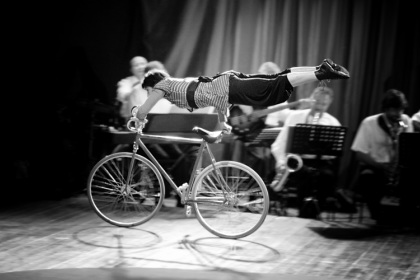Sign up...Join The Mindful Performer community to receive updates on upcoming workshops and new resources
|
|
|
You know those performances where you step off stage and someone says "how did it go?" ... and you realise you have no idea! The whole performance seems to be a blank, and you wonder if you forgot to even perform? Have you ever noticed that these are the performances where people then say " that was great - best I've ever heard you!" Why is it that amnesia seems to produce the best performances? When we first learn a new skill, it takes deliberate practice and repetition as our brain commits the information to our memory. We need to consciously process every detail in order to successfully wire the required neural pathways. This is fine when we are learning, but performance can include thousands of different technical aspects and there is only so much information our brain can consciously process at any given moment - it would be impossible to continue to consciously process every detail! So how do we get around this? Fortunately, our brains have this one covered. There are two types of long-term memory: explicit memory and implicit memory. Whilst explicit memory involves conscious recall (such as remembering a composers name, or what key signature you are performing in), skills that are practised regularly will eventually enter implicit memory (stored in a completely different area of the brain!). In implicit memory, we are no longer conscious of how we do something, we just do it! This is the kind of memory we use when we play or sing something we have known for some time, or swing a racket after years of practice... or ride a bike. Hence the saying, 'it's just like riding a bike'! Even after a long time without riding, we can get straight back on and ride without having to think about it. If we tried to explain every step, we would probably fall off. When someone performs using implicit memory it is referred to as 'expert induced amnesia' - hence your experience of not knowing how the performance went: you were performing unconsciously! Where it all goes wrong... So things are going along swimmingly, and you are performing using your implicit memory, great! But what happens when you then start to worry about your top note, or doubt whether you are playing or singing all the right notes in that phrase? All of a sudden, you are plunged out of implicit memory, back into explicit memory ... and you choke! This is known as 'paralysis by analysis' - basically, getting in the road! The problem is, you probably haven't used these neural pathways to perform this piece for some time, so it is just like you are a beginner again. Too much focus on technique whilst performing is dangerous! So what's the answer? "Master technique and then forget about it and be natural" Anna Pavlova The key is to TRUST. Trust is a skill, and like any other skill, it develops through practice. Recognise the damage that can be done when you try and control every last detail of your performance, and know that the best thing you can do is trust in your preparation, and let go - your body already knows what it needs to do, don't let your analytic brain get in the road! Given the alternative, it seems like the safer option! The good news! The good news is that all of this frees up your attention for what really matters - expression, interpretation of the music, and enjoying your performance. Seems like a win-win to me! Ready to learn how to trust?If you’d like to learn more you can sign up to receive blog posts direct to your email. Alternatively, please click the little ‘like’ symbol below. Or, if you're ready to tackle your inhibitions to performance head on, contact me to discuss your options and arrange an appointment.
0 Comments
Your comment will be posted after it is approved.
Leave a Reply. |
|
|
© Amy Radford 2014. ABN: 369 713 854 88. Contact
|
